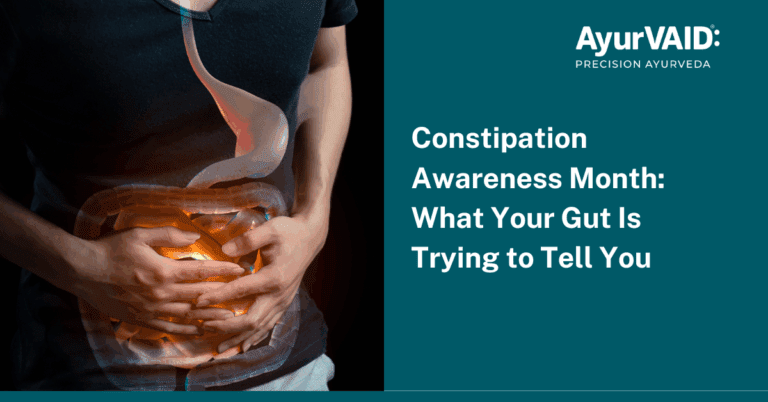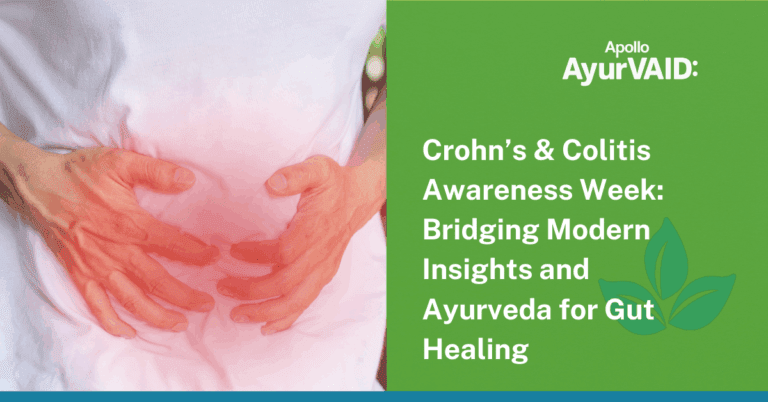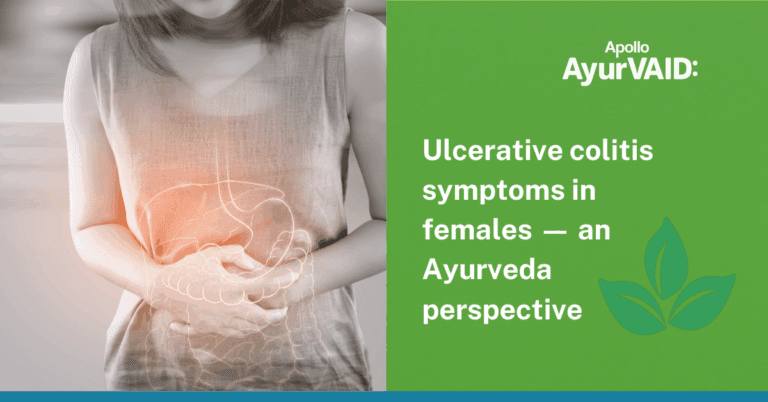Introduction
Have you ever wondered, “What is the meaning of acidity?” It’s a common question asked and understanding it can help manage the condition better. Acidity is a condition that occurs when gastric acid production in the stomach is more than usual. Symptoms include heartburn, stomach ulcers, and dyspepsia (discomfort or pain in the upper abdomen). It is due to an imbalance of acid secretions in the stomach and the upper intestine. This can be affected by diet, lifestyle, and environmental factors. Recognizing the underlying cause of acidity is crucial for effective diagnosis and treatment
In Ayurveda acidity is considered Amlapitta, a condition caused by an imbalance in Pitta dosha responsible for digestion (Pachaka) leading to hyperacidity and excess gastric acid secretion. Symptoms are heartburn, sour belching, and indigestion. In this blog, let’s explore the reasons for acidity and the Ayurvedic solution for acidity.

Reasons for Acidity
The following are the chief reasons that lead to acidity:
- Excess consumption of hot, spicy, sour, or fermented foods, irregular eating habits, improper food combinations, eating before digesting the previous meal, and excess intake of caffeine, carbonated beverages, citrus fruits, tomatoes, chocolate, mint, and alcohol can all stimulate the production of acid in the stomach and lead to reflux and acidity.
- Obesity, smoking, tension and anxiety, lack of exercise, poor sleep habits, and eating just before falling asleep can exacerbate the symptoms.
- Hiatal hernia, pregnancy, gastroesophageal reflux disease (GERD), stomach ulcers, delayed emptying of the stomach, and antibiotics may also result from acid reflux and increased acidity.
- Aspirin, ibuprofen, several blood pressure medicines, some antibiotics, and iron supplements can irritate the stomach lining and cause nausea, discomfort, and increased acid secretion.
- Tight clothes, lying down just after meals, bad posture, pregnancy, and a weak lower esophageal sphincter may contribute to acid reflux and heartburn.
As per Ayurveda eating hot and spicy food, irregular diets, stress, and bad sleeping patterns aggravate Pitta dosha while bad sleeping, anxiety, and obesity disturb Vata dosha. Obesity and a sedentary lifestyle are physical factors that aggravate Kapha dosha resulting in mandagni and improper digestion. This leads to an excessive production and upward movement of acids, causing Amalapitta. Stress and medications aggravate the already disturbed multiple doshas, further complicating the condition.
Ayurvedic Solution for Acidity
Ayurveda treatments aim to balance Pitta dosha and improve digestion. The main approach includes dietary and lifestyle changes, Ayurveda remedies, and Shodhana (cleansing) therapies such as Vamana (emesis), and Virechana (purgation).
- Vamana helps expel excess Kapha dosha from the body and relieves hyperacidity and digestive disturbances. If there is a lot of congestion or mucus, it would be advisable for a person to undergo Vamana.
- The objective of Virechana is to expel toxins away by purging for the removal of excess Pitta, balancing the digestive system, and bringing down acidity levels.
- Bitter gourd, pomegranate, etc bitter and sweet fruits pacify excess Pitta in the body. Sweets are light and increase digestive fire, hence helping in digestion.
- Pulses like green gram and lentils diet consist of well-cooked light and easily digestible food that enhance the optimum functioning of the digestive system. Vegetables like bitter gourd, matured ash gourd, and ridge gourd are helpful in detoxification, pacifying the Pitta dosha to reduce heat in the body and relieve acidity. Pomegranate, Indian gooseberry, and wood apple can balance Pitta, cooling in nature, soothe the digestive tract, and reduce inflammation.
- Coconut and lukewarm water maintain hydration while keeping the stomach pH balanced. Buttermilk (mostly astringent in taste) with cumin seeds acts as a digestive tonic, helping facilitate digestion.
- Avoid heavy meals, spicy, sour, salty foods, black gram, sesame, fermented foods, curds, alcohol, and hot, oily, and foods. These can overburden digestion and cause indigestion and acidity, thereby contributing to toxin accumulation in the body.
- Lifestyle changes include maintaining regular meal time, avoiding eating before the previous meal is digested, sleeping during the day, practicing correct food combinations, and relaxing.
- Yoga such as Halasana, Vajrasana, Pawanamuktasana, and Bhujangasana can help combat digestive discomfort and hasten efficient digestion.
- Meditation reduces stress and anxiety to some extent, the practice of pranayama provides adequate oxygen supply to the body, and reduces stress, subsequently aiding digestion, and regulating digestive fire (Agni).
- To prevent acidity, avoid lying down immediately after eating, maintain correct posture while sitting, be exposed to cold; eat fresh warm food, and eat small meals instead of large ones.
Apollo AyurVAID Approach
Apollo AyurVAID offers a personalized approach, focusing on Ayurveda therapies and lifestyle modifications. The treatment emphasizes a complete health assessment to identify the core cause, followed by further evaluations and clinical tests. Dedicated protocols help to analyze individual conditions, identify dietary triggers, stress, lifestyle patterns, and metabolic imbalances, and work on a highly individualized treatment plan.
The goal is balancing digestive fire (Agni), reduction in acid reflux, healing inflammation, and treatment of disease. Through our protocol-driven approach, we monitor symptoms and other health parameters. Specially trained Ayurveda physicians and therapists provide end-to-end care, restore digestive balance, and prevent recurrence. Key outcomes include heartburn and regurgitation symptom relief, regular bowel movements, reduced dependence on over-the-counter antacids, improved metabolic activity and digestion, better diet and lifestyle, long-term remission, and improved quality of life and mental well-being.

Conclusion
Acidity, or Amlapitta in Ayurveda, is a common digestive disorder that occurs because of imbalances in the digestive fire leading to the overproduction of gastric acid. Poor dietary habits, emotional and mental stress, and sedentary lifestyle choices are the most common causes. Ayurveda treatments mainly apply strategies to restore balance in the Pitta dosha by cleaning therapies like Vamana and Virechana. A diet tailored to the individual to improve digestion and reduce acidity is prescribed. Incorporating bitter and cooling foods, hydrating beverages, and proper food combinations can help maintain digestive health. Moreover, lifestyle changes such as eating on time, stress management, yoga, and maintaining a good posture promote digestion and reduce acidity. By adhering to these practices one can manage acidity and improve general health.
References
- Chaturvedi, D A (2025). A CLINICAL STUDY OF THE EFFECTIVENESS OF ABHAYA PIPPALAYADI YOGA ON AMLAPITTA ROGA (ACIDITY) EPRA International Journal of Multidisciplinary Research (IJMR) https://doi.org/10.36713/epra19898
- Aswathy, G et al. (2016). AMLAPITTA – A DISRUPTION IN THE PHYSIOLOGY OF DIGESTION: A REVIEW. International journal of research in ayurveda and pharmacy, 7, 11-14. https://doi.org/10.7897/2277-4343.075209
- Pawde, A (2017). CONCEPTUAL STUDY OF THE HOLISTIC HEALTH EFFECTS OF VAMANA KARMA IN AMLAPITTA BY NIMBA KWATH. Journal of Ayurveda and Holistic Medicine, 5, 51-58. https://www.semanticscholar.org
/paper/5331966064a6f438b555
6d941ed2297d32f49491 - Sharma, L, Rath, S K (2023). General Ailments Related with Agnidushti. AYUSHDHARA. https://doi.org/10.47070/ayushd
hara.v10isuppl4.1306 - Musale, P, Mankar, S (2023). A Review on Polyherbal Formulation Used in the Treatment of Gastric Acidity. Research Journal of Pharmacognosy and Phytochemistry. https://doi.org/10.52711/0975-4385.2023.00027






